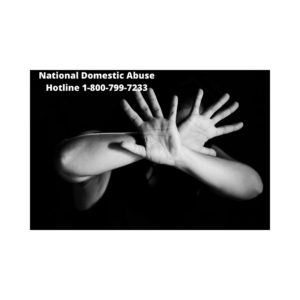Episode 28: Stop Domestic Violence – #Nocovidabuse
NATIONAL DOMESTIC VIOLENCE HOTLINE 1-800-799-7233
This episode is a really important one to share! Since Covid, the media has been reporting on a frightening spike in the number of domestic violence cases. Hot Flashes & Cool Topics wanted to do an episode to help raise awareness of the dangers of domestic violence and also to address the causes for the recent spike. This episode will hopefully explain what is domestic violence, what resources are available for survivors, how communities can help and about the campaign #nocovidabuse.
Unfortunately, domestic violence is a pandemic issue that has been around for generations, To education ourselves and our listeners, we contacted Chau Nguyen, Chief Public Strategies Officer of the Houston Area Women’s Center and she graciously agreed to talk to us about domestic violence and the increase in cases.

Chau is a fierce advocate for the Houston Area Women’s Center and for the efforts to stop domestic violence. She is tasked with managing and expanding key partnerships, while positioning HAWC as thought leaders in order to drive broad awareness of domestic violence and sexual assault, with a goal of reducing interpersonal violence and changing cultural norms about how survivors are understood.
Prior to her executive leadership in the non-profit space, Chau spent 15 years as a television news journalist and last served as an anchor and reporter with KHOU TV. She is the first Vietnamese American journalist to receive an Emmy Award for her documentary series covering a medical mission in Vietnam, and the Houston Press has named her Reporter of the Year.
Chau is a Licensed Master Social Worker and holds a Masters of Arts in Social Work from the University of Houston and a Bachelor of Arts in Communications from the University of St. Thomas. She has received numerous awards and was most recently honored as one of Houston’s Most Influential Women. Chau is frequently asked to emcee events, including Houston Mayor Sylvester Turner’s Inauguration in 2016. Chau is the proud mother of two young girls, Ryan and Myles, a Yorkie named Peanut, and she is an active member of Unity of Houston.
HOUSTON AREA WOMEN’S CENTER
The Houston Area Women’s Center works relentlessly to stop domestic violence and sexual violence and supports all in building safe and healthy lives through advocacy, counseling, education, shelter and support services. The Houston Area Women’s Center embraces the feminist belief that all individuals should have equal access to political, legal, economic, and social rights. They strive to create a community, especially for women, that embraces diversity, recognizes oppression, promotes empowerment and supports the right of all individuals to self-determination.
SERVICES THEY OFFER:
- Psychotherapeutic services in the form of Individual and Group services with a focus on trauma reduction, coping skills enhancement and knowledge building.
- Collaboration with other community partners to create a holistic wellness map and utilization of a multi-modal approach in bringing stability and healing from abuse history.
- A Career Development Program, including skills assessment, training, career planning and financial assistance for education.
- Advocacy, resources and referrals provided during individual appointments and weekly meetings.
- Women’s and Children’s Libraries
- Cafeteria dining serving three nutritious meals each day to all residents.
- Parenting education classes.
- A bench-lined courtyard garden and covered age-appropriate play areas.
- On-site early childhood education and Houston Independent School District classes.
- A Children’s Enrichment Program providing opportunities for after school education, field trips, summer camps and special events.
HAWC’s hotline provides survivors with immediate access to safety, medical attention and trauma informed needs assessment when they first reach out for help. Their Survivor Empowerment services help survivors live economically independent and self-determined lives. They believe a world without violence is possible and take action through their Violence Prevention and Culture Change programs to break the cycle of violence. They search to understand its root causes and adopt positive behaviors while systems and institutions collectively invest in efforts to reduce interpersonal violence, support survivors and hold perpetrators accountable.
Please remember HAWC type facilities are located all over the country. Contact 1-800-799-7233 and they can refer you to local agencies.
Domestic Violence Hotline:
(713) 528-2121
TDD Line: 713-528-3625
Toll Free: 1-800-256-0551
Sexual Assault Hotline:
(713) 528-RAPE (7273)
TDD Line: 713-528-3691
Toll Free: 1-800-256-0661
WHAT IS DOMESTIC VIOLENCE?
Domestic violence is a pattern of abusive behavior in any relationship that is used by one partner to gain or maintain power and control over another person through fear and intimidation, often including the threat or use of violence. Domestic violence also includes any actions or threats of actions that are used to influence another person.
Domestic violence can be:
Physical Abuse: Hitting, slapping, shoving, grabbing, pinching, biting, hair pulling, etc. are types of physical abuse. This type of abuse also includes denying a partner medical care or forcing alcohol and/or drug use upon him or her.
Sexual Abuse: Coercing or attempting to coerce any sexual contact or behavior without consent is a type of sexual abuse. Sexual abuse includes, but is certainly not limited to, marital rape, attacks on sexual parts of the body, forcing sex after physical violence has occurred, treating one in a sexually demeaning manner and controlling reproduction by sabotaging methods of birth control.
Emotional Abuse: Undermining an individual’s sense of self-worth and/or self-esteem is abusive. This may include, but is not limited to constant criticism, diminishing one’s abilities, name-calling, or damaging one’s relationship with his or her children.
Economic Abuse: Making or attempting to make an individual financially dependent by maintaining total control over financial resources, withholding one’s access to money or forbidding one’s attendance at school or employment are all forms of economic abuse.
Psychological Abuse: Elements of psychological abuse include, but are not limited to, causing fear by intimidation; threatening physical harm to self, partner, children, or partner’s family or friends; destruction of pets and property; or forcing isolation from family, friends, or school and/or work.
- Physical
- Sexual
- Emotional
- Psychological
- Economic
- Spiritual
Domestic violence can affect anyone.
There are many signs of an abusive relationship. The most telling sign is fear of your partner.
Does your partner …
- Intimidate?
- Manipulate?
- Humiliate?
- Isolate?
- Frighten?
- Terrorize?
- Coerce?
- Threaten?
- Blame?
- Hurt, injure and/or cause bruising?
Domestic violence often occurs in cycles, with periods of “normal or happy times” followed by increased tension and abuse. The cycle of violence repeats, sometimes over a period of months, sometimes within the same day. Domestic violence can affect anyone, regardless of income, race, ethnicity, sexual orientation, gender identity or religion. Domestic violence occurs in same-sex relationships, and men can be survivors as well.
Do you …
- Have constant fear of your partner?
- Feel helplessness or emotionless?
- Believe you deserve to be mistreated?
- Feel humiliated?
- Feel embarrassed to disclose to your friends/family?
- Feel your partner blames you for their own abusive behavior?
- Feel your partner’s temper is unpredictable?
- Feel your partner always tries to control you?
If so, please call the hotline or your local shelters for help.
PUBLIC HEALTH CRISIS

Domestic Violence is a public health crisis. It knows no gender, age, race or socioeconomic status. It is important to tell survivors that they are not alone and there is help. There are domestic violence centers throughout the US to offer assistance. The National Hotline Number offers support, resources and patch to the right organizations. It is also important to remember that violence affects the entire community and will take the community to stop domestic violence and sexual assault. Calls to the police and advocates engage an entire community into crisis.
ISOLATION:
When the stay at home orders went into place, it forced constant contact with a partner’s abuser. HAWC started a city wide camp to stop domestic violence #nocovidabuse. They are closely following the spike in phone calls and proactively contacting potential victims of abuse.
The economic stress of Covid is also a factor of the increase. Chau tries to monitor calls and has heard traumatic stories such as a nurse coming home whose partner threatened her because he believed she had Covid or another story of a nurse who refused access to necessary hand sanitizer. The stories are desperate and the isolation causes further stress. This is a dangerous time and that is why domestic violence advisors are raising their voices.
People are afraid to go to shelters because of Covid. The centers around the country are essential and therefore do not shut down. They taking serious steps to keep shelters and their facilities clean and disinfected so that they remain safe for survivors to go and seek shelter. If assessments deem it a life threatening situation, shelters are also offering additional accommodations. Houston offers the safe harbor hotel for this exact situation. Check with your local shelters about their facilities. #nocovidabuses
TIPS FOR HOME SAFETY
The moment a person decide to leave puts them in most danger, so planning safety in a relationship or prior to leaving can save a life. Safety planning includes:
- If things escalate, stay in a room with quick access to an exit.
- Keep your phone fully charged and with you.
- Give your children, friend or family members a 9-1-1 code word.
- Know where weapons are stored in the house.
- Take breaks from the house and get outdoors, if possible.
- Call the 24/7 free and confidential domestic violence hotlines.
- In an emergency, call or text 911.
Emotions run high when someone decides to leave. Safety assessments can be done over the phone. Contact the national hotline 1-800-799-7233.
Relationships with the police and advocates are improving in communities. HAWC has a wonderful relationship with law enforcement. There is a model called DART: law enforcement, prosecutor’s office, advocate are offered onsite to provide additional support to survivors. Additional programs such as Family Justice can help provide housing for the transition.
SHARE OPTIONS WITH LOVED ONES AND FRIENDS:
It is an extremely hard decision to leave an abusive relationship. Finances, child care and shame are only a few reasons why people stay. Try to listen from a place of compassion and not judgement.
If someone comes to you and confides abuse and plans to leave:
- Recognize: validate and use active listening. You are not alone and should not be ashamed.
- Respond: Respond in a positive way and not say things like you should just leave the partner.
- Refer: HAWC.org and many other resources are available. Let them know how to contact those resources.
Support groups are also offered that you can let survivors know about and can give them a sacred place to heal.
TRANSITION:
Shelters offer
- counseling
- vocational education
- school services
Rental vouchers, HUD resources, transitional housing can be offered for the next steps in a survivor’s transition. Regaining independence, employment and support groups are offered throughout the process but there is no timeline on recovery.
Community support is also vital to continue these programs. Donations and volunteering are invaluable resources for places like HAWC. Please contact your local shelters and services and find out how you can help.
STOP DOMESTIC VIOLENCE AND SEXUAL ASSAULT:
BREAK THE CYCLE:
It will take education, honest conversations and intervention to stop the cycle of domestic violence. Letting children know that this is not how someone should be treated in a relationship is a start. Teaching emotional and psychological coping skills is another way. Community outreach is vital.
Please remember there is help and you can contact the hotline by phone, text or computer.
Useful Resources:
National Domestic Violence Hotline: 1-800-799-7233 (you can also contact by text and online)
#NOCOVIDABUSE : Stop Domestic Violence
National Coalition Against Domestic Violence
Hot Flashes & Cool Topics Episodes